|
|
|
Sort Order |
|
|
|
Items / Page
|
|
|
|
|
|
|
| Srl | Item |
| 1 |
ID:
100624
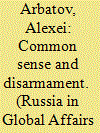

|
|
|
| 2 |
ID:
102888
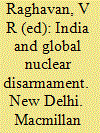

|
|
|
|
|
| Publication |
New Delhi, Macmillan Publishers, 2010.
|
| Description |
193p.
|
| Standard Number |
9780230327863, hbk
|
|
|
|
|
|
|
|
|
|
|
|
Copies: C:1/I:0,R:0,Q:0
Circulation
| Accession# | Call# | Current Location | Status | Policy | Location |
| 055839 | 327.17470954/RAG 055839 | Main | On Shelf | General | |
|
|
|
|
| 3 |
ID:
098841
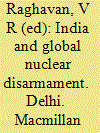

|
|
|
|
|
| Publication |
DelhI, Macmillan Publishers India Ltd., 2010.
|
| Description |
193p.
|
| Standard Number |
9780230327863
|
|
|
|
|
|
|
|
|
|
|
|
Copies: C:1/I:0,R:0,Q:0
Circulation
| Accession# | Call# | Current Location | Status | Policy | Location |
| 055412 | 327.17470954/RAG 055412 | Main | On Shelf | General | |
|
|
|
|
| 4 |
ID:
100623


|
|
|
| 5 |
ID:
095203
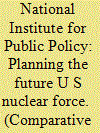

|
|
|
| 6 |
ID:
121223
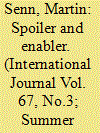

|
|
|
|
|
| Publication |
2012.
|
| Summary/Abstract |
The topic of nuclear disarmament has made an impressive comeback
since the four elder statesmen Shultz, Perry, Kissinger, and Nunn raised
the issue in their 2007 op-ed piece in The Wall Street Journal.
1
Embraced by
its advocates as the only safeguard against the use of nuclear weapons and
rejected by its opponents as a dangerous idealism, global nuclear zero has
been debated thoroughly in academic and policy-making circles.
|
|
|
|
|
|
|
|
|
|
|
|
|
|
|
|
| 7 |
ID:
110472
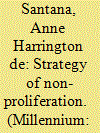

|
|
|
|
|
| Publication |
2011.
|
| Summary/Abstract |
This article criticises the leadership of the new nuclear disarmament movement in the United States for not going far enough. Whether the US administration actually wants to achieve disarmament or not, implementing the current US nuclear policy agenda will not produce a world free of nuclear weapons. Rather, it will reinvigorate an ailing non-proliferation regime by adapting it to confront new nuclear threats. This conclusion is based on a two-part argument. Firstly, nonproliferation is a strategy much like the Cold War-era strategy of extended deterrence. Just as extended deterrence required the US to maintain the credibility of an incredible threat to attack, non-proliferation requires the US to maintain the credibility of an incredible pledge to disarm. Thus, re-establishing disarmament as a credible long-term goal of US nuclear policy will persuade other states in the short term to forgo nuclear weapons and cooperate in restricting access to fissile materials. Secondly, contrary to the common-sense interpretation of the relationship between non-proliferation and disarmament, it does not follow that a robust non-proliferation regime will lead to the elimination of nuclear weapons. In fact, experience suggests just the opposite: Non-proliferation does not lead to disarmament. In conclusion, whatever the Obama administration's aim, the current US nuclear policy will reduce the threat nuclear weapons pose to the US, while obviating the need for the US to disarm itself.
|
|
|
|
|
|
|
|
|
|
|
|
|
|
|
|
| 8 |
ID:
091672


|
|
|
|
|
| Publication |
2009.
|
| Summary/Abstract |
To understand the prospects for engaging China and Russia on disarmament, the authors examine views of U.S. strategic policy in Beijing and Moscow, the two countries' mutual perspectives, and prospects for particular disarmament measures. Through an appraisal of nuclear force postures and doctrines and linkages to missile defense, conventional military capabilities, and possible space weaponization, the authors explain why nuclear disarmament involves strategic considerations writ large, and not simply nuclear weapons and their delivery systems. They analyze Chinese and Russian views of a variety of possible disarmament and arms control measures and relevant strategic considerations. While formal arms reduction negotiations are only likely with Russia in the short term, they note that confidence-building measures could already be instituted that involve China. Finally, they note there exists a small window of opportunity to move cooperatively toward nuclear zero; however, as decisions on military procurement are realized, this window will shrink.
|
|
|
|
|
|
|
|
|
|
|
|
|
|
|
|
| 9 |
ID:
119253


|
|
|
|
|
| Publication |
2013.
|
| Summary/Abstract |
Nuclear weapons remain deeply embedded not only in strategic thinking and force postures, but also in our political cultures in ways that assign multiple, powerful socio-political values to the bomb. Progress towards nuclear zero will necessarily require peeling away the layers of value to the point where it becomes politically, strategically, and socially acceptable to permanently relinquish a nuclear capability. The concept and process of devaluing nuclear weapons is contested. It is a broad concept that covers notions of reducing the role, delegitimizing, reducing the salience, and marginalizing nuclear weapons in the declaratory and operational policies of the nuclear powers. This article argues that to understand what a process of devaluing might look like, we first need a deeper understanding of how nuclear weapons are valued. To achieve this, the article moves through four stages. First, it provides an overview of the lexicon of devaluing and subsidiary terms in global nuclear discourse since the end of the Cold War. Second, it discusses how we know nuclear value and its discursive construction. Third, using the United Kingdom as a case study it explores the 'regime of value' in which British nuclear weapons are embedded and the implications for devaluing. Finally, it reflects on William Walker's notion of 'responsible nuclear sovereignty' and the tensions at the nexus of deterrence/devaluing.
|
|
|
|
|
|
|
|
|
|
|
|
|
|
|
|
| 10 |
ID:
099520


|
|
|
|
|
| Publication |
2010.
|
| Summary/Abstract |
The current nuclear nonproliferation order is no longer sustainable. The Treaty on the Non-Proliferation of Nuclear Weapons (NPT) has weakened considerably over the years, with nuclear have-nots displaying increased dissatisfaction with the status quo. Meanwhile, demands for civilian nuclear technology have led to increased proliferation risks in the form of dual-use technologies. Arms control as we currently understand it-piecemeal treaties and agreements-is no longer sufficient to address the growing threat of proliferation and the frailty of the NPT. This article calls for a bolder nonproliferation agenda pursuing multilateral nuclear disarmament. Disarmament is, in fact, technologically achievable; a lack of political will stands as the only remaining roadblock to a world free of nuclear weapons. A better understanding of the technological feasibility of disarmament, as well as recognition of the diminishing strategic value of nuclear weapons, will help to erode this political reluctance.
|
|
|
|
|
|
|
|
|
|
|
|
|
|
|
|
|
|
|
|
|